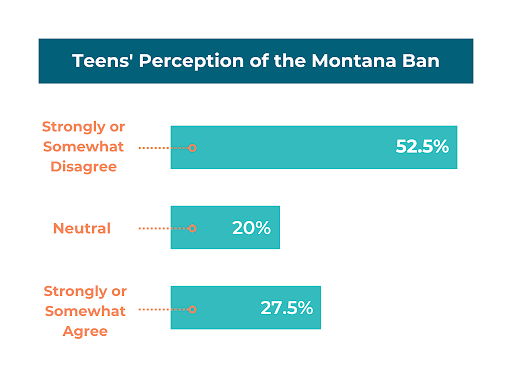Teens Speak Out Research Snapshot: Social Media Regulation
New survey from the Center for Scholars & Storytellers at UCLA finds most teens agree with the Surgeon General’s recent social media advisory, but disagree with new laws
In an effort to bridge the divide between adults and younger generations on the issue of social media and adolescent mental health, we conducted our first Teens Speak Out Research Snapshot to capture the valuable insights of young people on three major policy developments: Utah's parental consent regulations for social media usage, Montana’s TikTok ban, and the Surgeon General's advisory on social media. When teens have the opportunity to share their perspectives they usually have important things to contribute. So we went directly to 284 teens, ages 13-18, from across the United States to ask them what they think about the laws that are being passed around the country.
“... I don’t think that it should be banned for everybody. I think that our parents should take the time to teach us things that get harmless and things not to do but I don’t think social media should be banned as a whole because it has a lot of positive things although it has negatives too but if we are taught at a young age the difference between good and bad and what not to do and what to do I think it would be OK.”
Below we break down the findings.
Montana Bill: TikTok Banned
64% difference between male and female teens about ban
Only 27.5% of all teens said that the ban is a good idea. We wondered who are these teens that agree with banning something they use so much? Turns out when broken down by gender identity, the majority of the teens agreeing with the ban were male. 38.9% male teens agreed with the ban while only 19.7% female teens agreed - a whopping 64% difference. Moreover, teens who identify as non-binary disagreed the most that the ban was a good idea.
“I believe social media has taught me and many other kids important things about life and has kept us entertained during parts of our life like the pandemic. I feel it is important to let kids express themselves on social media because you are able to meet friends and communicate.”
“I think that the internet can indeed be dangerous, but that the restrictions that are being put on young people will overall make their quality of life and mental health worse rather than better.”
With teen girls using TikTok more than teen boys, this difference becomes even more significant.
Utah: Parental Consent for Under 18-year-olds
37% of all teens agreed with this legislation. In this instance, we again saw significant gender differences. Once more, male teens agreed most with the law, followed by females and non-binary teens. With females reporting that they use social media more than males, the fact that males agree more with restrictions about a medium they use least is interesting. While age differences were not significant, not surprisingly, older teens tended to agree more with parental consent than younger teens.
“I feel like the problem is that social media companies do not take any effort to censor harmful content to minors. When done correctly social media does help many kids socialize and improves their mental health.”
Surgeon General’s Advisory on Social Media
More than double the number of teens agree than disagree that social media use is harming young people’s mental health.
Finally we asked adolescents for their reactions to the following statement from the Surgeon General’s advisory:
“The most common question parents ask me is, ‘is social media safe for my kids’. The answer is that we don’t have enough evidence to say it’s safe, and in fact, there is growing evidence that social media use is associated with harm to young people’s mental health. Children are exposed to harmful content on social media, ranging from violent and sexual content, to bullying and harassment. And for too many children, social media use is compromising their sleep and valuable in-person time with family and friends. We are in the middle of a national youth mental health crisis, and I am concerned that social media is an important driver of that crisis – one that we must urgently address.”
A passionate polarity amongst adolescents emerged with 52.4% of teens strongly or somewhat agreeing with the statement and 22.2% of teens strongly or somewhat disagreeing with the statement (the rest were neutral). Gender was not significantly different so we do not report on those differences.
“I think it is definitely true that negative things on social media are harmful to teens. I believe that the positive things outweigh this though and that restrictions or rules can be added to get rid of negative things but positive things can be there still.”
Despite adolescents’ persistent desire for digital connectivity, adults remain doubtful of their ability to navigate the online landscape responsibly. The fear and distrust shared by older generations has manifested in policymakers’ attempts to impose limitations and even outright bans on the very platforms that have become an integral part and for some a vital mental health tool in young people’s lives.
Contributions: Jamie Azar, Dr. Alisha Hines, Emma Terrell, and Dr. Yalda T. Uhls
To see the methodology for this report, click here.
To learn more about the Teens Speak Out Research Snapshot series, click here.





